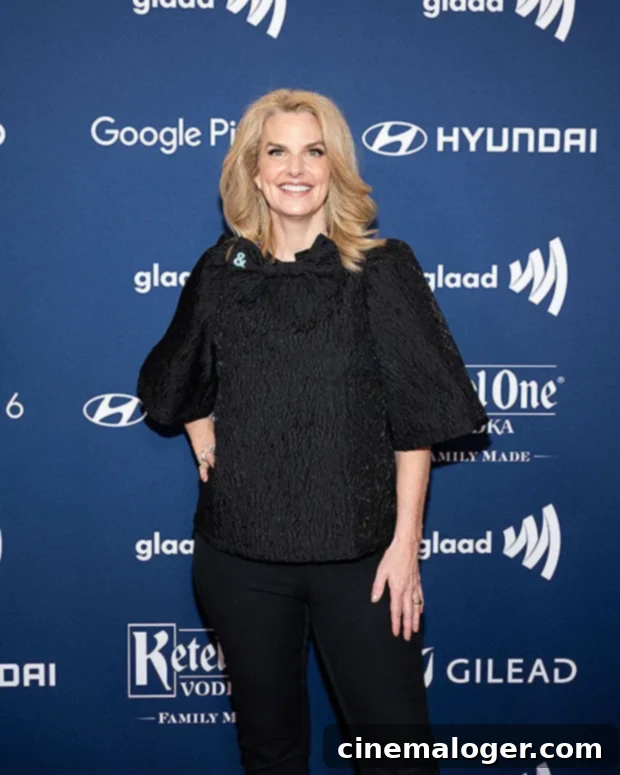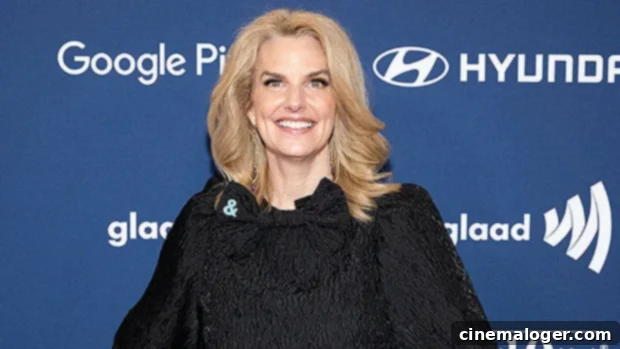GLAAD CEO Sarah Kate Ellis Sounds Alarm: Overturning Roe v. Wade Poses Grave Threat to Marriage Equality and LGBTQ+ Rights
In a candid and powerful statement, Sarah Kate Ellis, the visionary CEO and President of GLAAD, has emerged as a prominent voice articulating profound concerns over the Supreme Court’s potential decision to overturn Roe v. Wade. Speaking exclusively with Hollywoodlife on May 6th at the illustrious 33rd annual GLAAD Media Awards in New York City, Ellis shared her unequivocal views on the far-reaching implications of such a monumental legal shift.
With a palpable sense of frustration and urgency, Ellis remarked, “Roe v. Wade is 50 years old and is about to be gone. Marriage equality is about to be gone. Marriage equality is 10 years old and it is based on the same principles as Roe v. Wade.” Her words highlighted not just the immediate threat to reproductive rights, but also a looming danger to other established legal protections, particularly those safeguarding the LGBTQ+ community.

The Domino Effect: From Reproductive Rights to LGBTQ+ Freedoms
Ellis articulated her opinions with precision, outlining how the overturning of Roe v. Wade would ripple across the nation, affecting various aspects of American society and the legal rights of diverse, marginalized groups. Her core belief is that this decision serves as a stark indicator of what lies ahead for fundamental human rights, extending far beyond the realm of reproductive health. Specifically, she argues that abortion rights and broader human rights are inextricably linked, and if this foundational precedent is dismantled, the hard-won LGBTQ+ rights could unequivocally be put in jeopardy.
The legal framework underpinning Roe v. Wade primarily rests on the constitutional right to privacy, a principle that has been interpreted by the Supreme Court to protect personal decisions regarding family, marriage, and bodily autonomy. This very principle forms the bedrock for other landmark decisions, including those that legalized contraception and, crucially, marriage equality. For Ellis and many legal experts, striking down Roe v. Wade would not merely revoke the right to abortion; it would chip away at the very notion of an individual’s right to make personal decisions free from governmental interference, thereby creating a dangerous precedent that could be applied to challenge other rights deemed “unenumerated” in the Constitution.
Understanding the Interconnectedness of Rights
Ellis’s concern stems from the legal logic and constitutional interpretations that have historically protected both reproductive freedom and LGBTQ+ rights. Decisions like *Obergefell v. Hodges*, which established the right to marry for same-sex couples, are often rooted in similar arguments concerning liberty and privacy found within the Fourteenth Amendment’s Due Process Clause. If the Court demonstrates a willingness to revisit and overturn long-standing precedents based on these principles, it suggests a broader shift in judicial philosophy that could impact a myriad of other rights that have evolved through judicial interpretation.
The potential revocation of Roe v. Wade, a nearly half-century-old precedent, could signal a judicial willingness to invalidate other rights not explicitly mentioned in the Constitution but established through evolving societal norms and legal understanding. This perceived vulnerability extends directly to marriage equality, which, at just a decade old, relies on similar interpretations of personal liberty and autonomy. The fear is that if the state can dictate decisions about one’s body and reproductive choices, it could logically extend to dictating who one can marry or how one can express their identity. This interconnectedness of rights forms the crux of GLAAD’s and Ellis’s urgent warnings.
A Resounding Call to Action: Safeguarding Equality Through Legislation and the Ballot Box
When pressed on the tangible steps that American citizens should take to safeguard marriage equality laws in the face of a potential Roe v. Wade overturn, Sarah Kate Ellis laid the responsibility squarely at the feet of the populace. Her message was clear and direct: civic engagement and legislative action are paramount. “We have an Equality Act that protects our community at the federal level that has gone through the House and is stalled in the Senate,” she explained. “We need the Senators to move on this piece of legislation so that we are not vulnerable like Roe v. Wade is vulnerable.”
The Imperative of the Equality Act
The Equality Act represents a vital piece of federal legislation designed to provide consistent, nationwide non-discrimination protections for LGBTQ+ individuals across key areas of life, including employment, housing, public accommodations, education, federal funding, and the jury system. Currently, protections for LGBTQ+ people vary significantly from state to state, leaving millions vulnerable to discrimination. Passing the Equality Act would codify these protections into federal law, offering a crucial shield against prejudice and ensuring that LGBTQ+ Americans are treated equally under the law, regardless of where they live. Ellis’s emphasis on its passage underscores the proactive measures needed to fortify LGBTQ+ rights against future legal challenges, especially in an environment where judicial precedents may be reevaluated.
The Unwavering Power of the Vote
Beyond legislative advocacy, Ellis stressed the enduring importance of electoral participation. “And we need to vote! Voting is always critical. I know and we know that when LGBTQ+ people vote, pro-equality people end up in office,” she declared with conviction. Her statement is a rallying cry, highlighting the direct correlation between voter turnout and the election of officials who champion human rights and equality. These elected representatives, she noted, are typically those who “care about body autonomy. They care about trans people, and they care about immigrants.” For Ellis, supporting a “pro-equality ticket is a ticket for humanity,” encompassing a broad spectrum of social justice issues that uphold the dignity and rights of all individuals.
This message resonates deeply in the current political climate. The composition of legislative bodies and the judiciary directly impacts the enactment and interpretation of laws affecting fundamental rights. By encouraging active participation in elections, Ellis empowers citizens to directly influence the political landscape and elect leaders who will defend established rights and push for new protections, rather than dismantle them. It is a powerful reminder that democracy requires active engagement to safeguard its most vulnerable populations.
GLAAD’s Enduring Mission: Amplifying Voices, Battling Hate
The GLAAD Media Awards, the very backdrop for Ellis’s significant remarks, are an annual testament to the power of media. This prestigious event honors the exceptional work of influential LGBTQ+ artists and allies in various media forms, recognizing their contributions to fair, accurate, and inclusive representation of the LGBTQ+ community. The awards are more than just a celebration; they are a strategic platform to highlight stories that foster understanding and accelerate acceptance.
Ellis underscored the critical role of these awards and the visibility they generate, particularly in challenging times. In an email statement, she elaborated, “This year’s GLAAD Media Awards come at a time where LGBTQ+ visibility and storytelling can be the frontline response to a dangerous rise in anti-LGBTQ+ legislation around the country.” Her words reveal GLAAD’s profound understanding of the media’s influence in shaping public perception and policy. In an era marked by increasing legislative attacks against LGBTQ+ rights, especially targeting transgender individuals, authentic and diverse storytelling becomes a potent weapon against misinformation and prejudice.
The Power of Storytelling in the Fight for Equality
Visibility through media, whether in film, television, journalism, or digital content, plays a crucial role in demystifying the LGBTQ+ experience, building empathy, and challenging harmful stereotypes. When people see themselves and their diverse lives reflected accurately, it affirms their existence and fosters a sense of belonging. Equally important, when allies witness these stories, it broadens their understanding and strengthens their support for the community. These narratives educate, entertain, and, most importantly, humanize, thereby counteracting the dehumanizing rhetoric often used to justify discriminatory legislation.
Ellis powerfully concluded her message: “At a time when we need it most, these stories, these stories rise against hate, enlighten, entertain, and send an undeniable message: we are not going anywhere.” This unwavering declaration serves as both a testament to the resilience of the LGBTQ+ community and a clear articulation of GLAAD’s ongoing commitment to fighting for equality through the compelling power of media. It is a message of hope, defiance, and persistent advocacy, reminding everyone that the fight for justice is far from over and that visibility remains a cornerstone of progress.
In essence, Sarah Kate Ellis’s warnings at the GLAAD Media Awards were not just about a single Supreme Court decision but about the fundamental principles of liberty and equality that define a just society. Her call to action – advocating for the Equality Act and emphasizing the critical role of voting – underscores the collective responsibility of all Americans to protect and uphold these rights for every individual, ensuring that democracy truly works for humanity.
